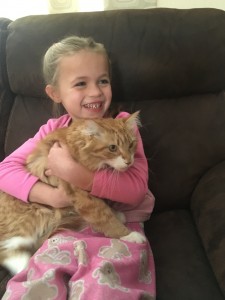Where we are at: apraxia, articulation, language
It has been awhile since I posted directly about Ashlynn’s speech. Once we all started to understand her, it didn’t seem as pressing anymore. Her dyspraxic components (gross and fine motor skills) definitely started to take precedence. However, she is still in speech for a reason, and that reason being percentile ranks well, well, well below average.
Ashlynn is 6 years and 2 months. She can say every single sound in the English language correctly, including an /r/, which is a victory for me! If you’re an SLP you understand immediately; but if you’re not, you should know that an /r/ error is basically an entirely different monster that usually takes years to remediate. Unfortunately, she also has a profound frontal lisp. If you’re an SLP, again you understand immediately why I added unfortunately; but if you’re not, you should know that a lisp is also an entirely different monster that takes A LOT of time to remediate.
Though I am paying for private therapy, a lisp is pretty low on the priority list. She is understood in most contexts with varying communicative partners. You might ask, “What is she in speech for then?”
Oh baby, that is a loaded question. We are called speech/LANGUAGE pathologists for a reason. Where there is a speech delay (referring to sound production), there is frequently a language delay. Language runs the gammit from receptive (what you understand), to expressive (what you say). Expressive language includes but is not limited to: vocabulary, grammar, syntax, narrative language, and word finding. Ashlynn has deficits in EVERY…SINGLE….ONE of those language areas.
Her “speech” goals span the spectrum of just understanding complex directions and sentences, to actually producing sentences with a variety of nouns, verbs and adjectives.
There is a physical therapist overseas who is marketing a therapy strategy that is supposed to be amazing for apraxia. He doesn’t understand the uproar about a PT marketing therapy for a very specific and misunderstood speech disorder like apraxia. May I direct your attention to my above statement about us being language therapists too. He may have found some style that helps speech sound production, but is he the guy you want when your child has a low vocabulary? Struggles with word finding? Can’t get pronouns or tenses straight?
Um yeah. Probably not. He won’t have a clue what to do, and an SLP will be automatically incorporating these elements into therapy. Oh, but I digress. That’s another topic!
So for Ashlynn, she is working to her expand her vocabulary using more verbs and adjectives, but also to make sure she is using the correct pronouns, verb tenses, and temporal concepts (tomorrow, yesterday, last night etc).
Word finding is a huge piece, but also vocabulary. Vocabulary encompasses skills such as describing, defining, telling how two things are alike or different, categorizing, etc. We are working on it though.
Pronouns are getting better after correcting her for at least a year. She knows the difference, but when she is speaking she messes them up. She is doing pretty good with subject/verb agreement and using present and regular past tense, but still needs to work on irregular past tense.
Receptive language is also low. I’m hoping we will see this improve as she is on her attention medication now and better able to focus. She knows most of her positional concepts, but other ones like farthest, widest, etc are more difficult. She knows the difference between all wh? questions (what, when, where, who, why), and can answer basic questions; but she is lost as they become more complex, particularly with a book that contains a lot of text.
Oh and I forgot to mention phonemic awareness. She is stuck at around 50% accurate for identifying rhymes and initial sounds. Her SPED teacher is using both whole language and phonics approaches for her reading. Edmark is a program that she uses and I have seen amazing progress with in regard to her other students, so I hope Ashlynn will be the same.
Sometimes it’s a blessing a curse because I feel like I know too much. I know her deficits, and I know if not remediated, what additional deficits they will cause. I also hate that lisp, but seriously, priorities. Everyone can understand her…..lisp or not, so that’s going to wait.
Her next IEP will be this coming Spring. I’m looking forward to all the growth she will make between now and then. We’ll keep on keeping on, and I’ll believe, like I always believe, that great things are waiting to happen. When we look for negative things, we will find them, but the opposite is true too! Here’s to 2016! Cheers!

